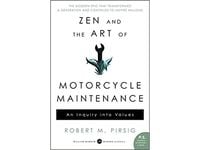The beauty of the motorcycle is that it can be the lens through which we view the world. If you’re interested in history or art or engineering or philosophy, the motorcycle is a ready subject of contemplation. As the following books explore, wrenching on a motorcycle can express the dignity of manual work, it can be a tool of existential discovery, and it can be a tool for observing the human condition and formulating a political ideology. Check out the philosophical side of the motorcycle with three books that confirm that it’s more than just an assemblage of hardware.
Matthew B. Crawford holds a Ph.D. from the University of Chicago, but his work as a motorcycle mechanic and an electrician has likely been his most formative education. In Shop Class As Soulcraft, Crawford makes a case for the value of the manual arts, both as an economic good and as an ennobling act that affirms the wholeness of being. We don't merely have_bodies; we _are bodies. The disassociation felt by the disaffected "knowledge worker" is rampant in a culture that has thumbed its nose at manual labors. Crawford's work is a call to come to our senses.
If you picked up Robert Pirsig's classic narrative hoping for a book about motorcycles or motorcycle maintenance, you were probably sorely disappointed. Zen is about a man's quest to figure out how to live. Like a motorcycle trip, the story is more about the journey than about the destination. It's a quietly sad book, but one that's stood the test of time.
Che Guevara’s mustachioed, beret-wearing likeness, printed on T-shirts and worn by unwitting teenage suburbanites who think they’re being countercultural, has become a meaningless symbol swallowed up by a capitalist machine that’s packaged it for mass consumption. Oh, the irony. Guevera’s pre-revolutionary motorcycle journey across South America is insight into his formative years.



/cloudfront-us-east-1.images.arcpublishing.com/octane/ESEQXKLW2BFADFTTIMGUVUQBOY.jpg)
/cloudfront-us-east-1.images.arcpublishing.com/octane/EHHGX7WY6REFLFPN4LWXVC2QP4.jpg)
/cloudfront-us-east-1.images.arcpublishing.com/octane/YNGKWQRUMJEVLL5HTPPAEHIUQA.jpg)
/cloudfront-us-east-1.images.arcpublishing.com/octane/MB5GFVVTBVFY3PFOAQH5CLZTYM.jpg)
/cloudfront-us-east-1.images.arcpublishing.com/octane/R26K447HPJFXNL7HDNAIY4VOI4.jpg)
/cloudfront-us-east-1.images.arcpublishing.com/octane/U3S3JPJT5REW7NTPZMUP2FZY3A.jpg)
/cloudfront-us-east-1.images.arcpublishing.com/octane/WPQ2LXEKPVFZRF2CZLPSDOMVAI.jpg)
/cloudfront-us-east-1.images.arcpublishing.com/octane/BNSDRE4DCJE5ZPOLGPBZPOMZEI.jpg)
/cloudfront-us-east-1.images.arcpublishing.com/octane/GO6FSVIIKNBVPLSIS7IBWE7AEM.jpg)
/cloudfront-us-east-1.images.arcpublishing.com/octane/CS6TMZNTENGKFDW56HSE2HFZ2M.jpg)
/cloudfront-us-east-1.images.arcpublishing.com/octane/FUFID44YDBAM3EHF2AV5LDHLVE.jpg)
/cloudfront-us-east-1.images.arcpublishing.com/octane/QKEXZXUGVFATPE7RAT3HAHDQZ4.jpg)
/cloudfront-us-east-1.images.arcpublishing.com/octane/T7GEMBOUDBHX7EDP2PRQ2J2XME.jpg)
/cloudfront-us-east-1.images.arcpublishing.com/octane/U4CKRUKLKZD43FDSDLZHBL7YVA.jpg)
/cloudfront-us-east-1.images.arcpublishing.com/octane/OFSXJJ5PZFEZ5D5ZPMCFVHJUMA.jpg)
/cloudfront-us-east-1.images.arcpublishing.com/octane/N2JLNLG44VEKBMEPORRDTMX5A4.jpg)
/cloudfront-us-east-1.images.arcpublishing.com/octane/PYWEGG6FHJD6XLPKICS7XHMMZ4.jpg)
/cloudfront-us-east-1.images.arcpublishing.com/octane/XXFQQQ4AYJDCXDGVW3JTHAYONI.jpg)
/cloudfront-us-east-1.images.arcpublishing.com/octane/WMF36OICPZEJDPKABMHQVHXBZ4.jpg)
/cloudfront-us-east-1.images.arcpublishing.com/octane/3DJ46QYFAJA5RIJILQR2XIZXM4.jpg)
/cloudfront-us-east-1.images.arcpublishing.com/octane/4HYMMY6K4JHMNEQ56FXTGAHKG4.jpg)
/cloudfront-us-east-1.images.arcpublishing.com/octane/KUENZXA3RFBIHIDGHEEVH6YNYE.jpg)
/cloudfront-us-east-1.images.arcpublishing.com/octane/UW6THULV65E4TDI4DWLOMDR7LY.jpg)
/cloudfront-us-east-1.images.arcpublishing.com/octane/5S5CDZTZPJBHJBLHENVXEFYKG4.jpg)